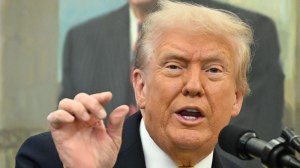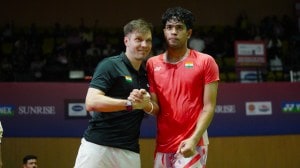Tome Travelling
Politicians and writers,filmmakers and artists look back at 2009 through the books they have read and loved...
Manmohan Singh,prime minister
To be candid,I do not get as much time to read books as I would have liked. However,I did read,in parts,Jaswant Singhs book Jinnah: India-Partition-Independence. Right now I am reading Anthony J. Badgers FDR: The First Hundred Days. It is a remarkable account of how it was possible to harmonise a vibrant vision of reform with the prevailing political realities to joggle out of systemic complacency. I also managed to browse through Economic Meltdown and Geopolitical Stability (eds: Ashley Tellis,Andres Marble and Travis Tanner), A Blueprint for a Safer Planet by Nicholas Stern,Castes of Mind: Colonialism and the Making of Modern India by Nicholas B. Dirks,and the Urdu Translation of Ela Bhatts We Are Poor But So Many.
Meira Kumar,Speaker,Lok Sabha
I loved Hilary Mantels Wolf Hall,the story of Thomas Cromwell which won the Man Booker Prize this year.
Kapil Sibal,Union minister
Gurcharan Dass new book The Difficulty of Being Good: The Subtle Art of Dharma was excellent.
Sitaram Yechury,MP
In fiction,I enjoyed Stieg Larssons The Millennium Trilogy,Olen Steinhauers spy thrillers based in Eastern Europe and Dan Browns The Lost Symbol; in nonfiction,Amartya Sens The Idea of Justice,Ramachandra Guhas India After Gandhi and Jaswant Singhs Jinnah: India-Partition-Independence. Among popular science books,I liked V.S. Ramachandrans The Emerging Mind.
Shashi Deshpande,writer
One of the best books I read this year was Home by Marilynne Robinson,a companion to her earlier Gilead. If Gilead was excellent,Home is even better. This is a novel which will stay long with me. I also read P.D. James latest,The Private Patient. Compared to her previous novels,it somehow falters. Nevertheless a very readable book from a good writer. The Surgeon of Crowthorne by Simon Winchester is fascinating,because this story of a crazy lexicographic doctor connects to the creation of the Oxford English Dictionary and its compilation by James Murray. Bill Brysons Mother Tongue interested me for being a kind of history of the English language,of its virtues and vagaries. Its full of fascinating facts. Both English-lovers and English-haters in India should read this book. At present Im reading Margaret Atwoods nonfiction,Curious Pursuits. The essays make for interesting and absorbing reading; like her novels,they are brilliant,witty and full of thought-provoking ideas. I thought Khaled Hosseinis A Thousand Splendid Suns was,if not as good as The Kite Runner,still interesting,mainly because of the glimpses we get of the lives of Afghan women,as well as of the complicated politics of that time.
William Dalrymple,writer
My favourite book this year was Basharat Peers wonderful,sad,passionate memoir of growing up in Kashmir Curfewed Night. His revelations need to be read by anyone who wishes to understand why the Valley remains so restless 20 years after the violence began. Mimlu Sens Baulsphere was also a revelation. A love story,travelogue,book of devotion and work of ethnography and theology,it is also a keyhole to a living mystical musical world that is almost completely unknown outside Bengal. Sen explores this extraordinary world in a book remarkable for its wonderful prose,its emotional honesty and learning. In Other Rooms,Other Wonders is an astonishing collection of short stories by the new star of South Asian fiction,Daniyal Mueenuddin. The authors humane and humorous appreciation of rural life,seen from the point of view of the landlord,depicts a world familiar from Sketches from a Huntsmans Album,but with the action transposed from the Russian steppes to the Pakistani Punjab. Like Turgenev,Mueenuddin creates a world peopled by rural folk,generously sketched with a wonderful freshness and lightness. Wendy Donigers The Hindus: An Alternative History is an earthy,revelatory and brilliant book by one of the great Sanskrit scholars,focussing on the relationship between myth and recorded history in Indian religion. Sam Millers Delhi: Adventures in a Megacity teems with strange stories and bizarre quiddities that will delight Delhi lovers and baffle those who have so far remained oblivious to its erratic charms. Doggedly pursuing his subject through the meandering back lanes of the old city,its spiralling markets and its gleaming new highways,Miller has created a book that is both a quest and a love letter,and one which is as pleasingly eccentric and anarchic as its subject.
Kanimozhi,MP
The book I really liked in 2009 was The Idea of Justice by Amartya Sen. Many started believing that reaching out was not needed anymore; many started thinking along the lines of moving away from social justice. In that context,this book brings to the fore a lot of questions about inclusiveness and social justice.
Omar Abdullah,chief minister,Jammu & Kashmir
A few books I read and enjoyed this year include Sea of Poppies by Amitav Ghosh,Solo by Rana Dasgupta,Ghost Train to the Eastern Star by Paul Theroux and The Girl with the Dragon Tattoo by Stieg Larsson.
Sunil Gangopadhyay,writer
The best book that I read this year was Amitav Ghoshs Sea of Poppies. I love Ghoshs eye for details,the exhaustive research he does and which shows in his accounts of times past. The time that he talks about is also an important part of the history of colonial rule in India. Not much has been written about the social ramifications of poppy cultivation,and Ghoshs work is quite path-breaking in that sense.
Gurcharan Das,writer
A lot of the books I read this year was in connection with my own writing based on the Mahabharata. I found some really great translations of the epic: for the first five books,the translations of J.A.B. van Buitenen; a jewel of a translation,in verse,of Chapter 10 by W.J. Johnson called The Sauptikaparvan of the Mahabharata; and The Bhagavad-Gita by Barbara Stoler Miller which is accurate,poetic and has the great virtue of simplicity. The biggest discovery,however,was the Clay Sanskrit Library launched by the New York University Press. Their battle books (Book VI to IX) are marvellous,especially Book Seven: Drona translated by Vaughan Pilikian where words jump out of the page.
Aravind Adiga,writer
In a year full of mediocre realist narratives,Thomas Pynchons Inherent Vice came as a relief: a playful and freewheeling detective novel set at the end of the 1960s. Beneath the mayhem and slapstick is a fierce tribute to a more tolerant era in American life. Its hard to write about parenting and harder to write about writing. Soumya Bhattacharya manages to do both well in his lovely debut novel,If I Could Tell You. Im still making up my mind about Glen David Golds Sunnyside,but if it has me thinking about it six months after I read it,Im inclined to give it the benefit of the doubt. Charlie Chaplin is the hero of the very talented Golds entertaining and provocative second novel.
Basharat Peer,writer
One of the books I absolutely loved this year was Peace by Richard Bausch. It is one of the most insightful accounts of what war does to men by a writer of razor-sharp prose. Steven Galloways The Cellist of Sarajevo is a brilliant novel again about war and life and home by a writers writer. Four non-fiction books which I loved were The Way of the World by Nicolas Bouvier,a journey from Geneva to Afghanistan; Anthony Lukas Common Ground,the classic non-fiction account of race in America; and Rebel Land: Among Turkeys Forgotten Peoples by Christopher de Bellaigue; and William Dalrymples Nine Lives.
Jairam Ramesh,Union minister
I liked best Nicholas Thompsons The Hawk and The Dove: Paul Nitze,George Kennan and the History of the Cold War for its wonderful mix of private and public history.
Resul Pookutty,sound designer
The Other Side of Silence by Urvashi Butalia: its a heart-wrenching story of what women went through during Partition. Everybody Loves a Good Drought by P. Sainath: this one is an amazing book where Sainath,as he always does,goes to the grassroots and talks about contemporary India. Govardhan Travels by Anand: its a Malayalam novel that I absolutely loved reading this year. Its a kind of time-travel book that follows Govardhan,the common man,who continues to seek justice but gets punished.
Amitava Kumar,writer
As I was putting finishing touches on a book on the war on terror,I went through a lot of writing about prisons and torture. Jane Mayers The Dark Side was the pick of that depressing lot. My friends in New York City went to watch The Gods of Carnage; I couldnt go but I read the play written by Yasmina Reza. I recommend it. It is always nice to find the ordinary viciousness and violence of our daily lives being given tight,dramatic form. I read some fiction and two books stand out. Daniyal Mueenuddins book of stories,In Other Rooms,Other Wonders,lived up to its promise it reminded me powerfully of Ruth Prawer Jhabvala. I should add that I was turned off by Mueenuddins comment on American radio that Pakistani writers dealt with gritty reality while Indian writers had the luxury of lying in their warm baths ruminating lifes little comforts. Grit is like paan for a middle-class classical musician in Amit Chaudhuris The Immortals. I loved the book for its delicate portrait of the artist as part-genius,part grihaswami or householder. Two edited collections also come to mind. The first was Love is a Four-Letter Word,an anthology of non-fiction essays about break-ups,edited by Michael Taeckens. It is low on sentimentality and other assorted ills,but overflowing with humour and honesty. Another book that made an impact was Delhi Noir edited by Hirsh Sawhney,not so much for what a range of writers does with the conventions of noir but for the way in which style conjured a place in this case,the city of my youth. I read very little poetry but thought Kathleen Sheeder Bonannos Slamming Open the Door,documenting the murder of her daughter at the hands of her ex-boyfriend,was lyrical and harrowing and strong. I also read very little,alas,in translation. But I very much enjoyed Jason Grunebaums translation of Uday Prakashs Hindi novella which was published as The Girl With the Golden Parasol. Uday is an angry writer; hes not trifling with pretty things.
Rukun Advani,publisher,Permanent Black
If P.G. Wodehouse had decided to take a break from Lord Emsworth of Blandings and instead wrote about Lord Mountbatten of Burma,the result could have been Alex von Tunzelmanns Indian Summer: The Secret History of the End of an Empire. This book is like a fabulous spoof on the famous Subaltern Studies series. We find out here that the real centre of the Indian national movement was less Mahatma Gandhi than Lady Edwina Mountbatten. The narrative drive and superior English prose make this the most entertaining book you can read on Indian nationalism as an upper-class affair. Over the past year Ive specially enjoyed the Swedish writer Stieg Larssons The Millennium Trilogy. This is in part because it manages to create a kind of crime writing which is also a political critique of gender injustice and state authoritarianism. My favourite in that trilogy is the first,The Girl with the Dragon Tattoo,in which the heroine,Lisbeth Salander,very satisfactorily kicks a lot of male chauvinist pigs where it hurts. The novels of Henning Mankell,another Swedish crime writer,and of Peter Robinson,a British crime writer,are great favourites. I read Mankells Sidetracked and Robinsons The Summer That Never Was,both brilliant.
Chetan Bhagat,writer
My favourite was a nonfiction book called Black Swan: The Impact of the Highly Improbable by Nassim Nicholas Taleb. It talks about improbable events having a larger impact on life than we think,and how we can actually utilise uncertainty in a positive manner. It helped me weigh the decision of quitting my job,the stability/uncertainty dilemma. Another favourite was Eat,Pray,Love by Elizabeth Gilbert,an American girls memoir on how she recovers from a breakup and fights her inner demons.
Aamir Khan,actor
Of all the books I read this year,there are three that I cant stop thinking about. The first is called A Confederacy of Dunces by John Kennedy Toole. Its a really funny and well written book. A Short History of Nearly Everything by Bill Bryson is so easy to read and yet so informative. I really enjoyed reading his personal perspective on everything. Then the Swedish author Stieg Larssons first book of The Millennium Trilogy: I was absolutely hooked to The Girl with the Dragon Tattoo. It is such a fast-paced thriller that I couldnt put down once I started.
Ali Sethi,writer
This year I reread Susan Sontags Against Interpretation and Other Essays,and was dazzled and nourished and finally humbled by its wisdoms. I also reread John Bergers Ways of Seeing,which is nowadays stored in cool,dry places and kept out of the reach of children,and with good reason (from the censors point of view),since it always manages to initiate the young artists rebellion.
L.K. Advani,BJP leader
I liked two books in particular this year,Gurcharan Dass The Difficulty of Being Good and Ramdhari Singh Dinkars epic poem in Hindi Rashmirathi. I also re-read Alvin Tofflers Future Shock,which I had first read during the Emergency years.
Mira Nair,filmmaker
I read Amitav Ghoshs Sea of Poppies only this year and loved it. Such rich,wild characters in a page-turning story about a time in our history that I longed to know about the beginnings of migration out of India. I cant wait for the next book.
Jeet Thayil,writer
Roberto Bolanos 2666: I love this book because there is more poetry in Bolanos prose than in most poetry collections.
Dibakar Banerjee,filmmaker
I am reading Movie-Made America by Robert Sklar and it has been a huge eye-opener on how films work on people. It brings together the economy,anthropology,business,law and ethics of Hollywood,and America.
Vivan Sundaram,artist
The novel that I found exceptionally complex and moving was Rana Dasguptas Solo. What impressed me was the kind of engagement he has with the subject and how he deals with the tension in the plot. There are jump cuts,the language is simple and interesting,and it deals with the complexity of how the capitalist institution might not be able to deliver.
Sankar,writer
I have just completed Girish Chandra Ghosh: A Bohemian Devotee of Sri Ramakrishna on the life and work of the Bengali stage veteran who died nearly a century back. The book,written by Swami Chetanananda,takes you down the era,considered among the best in the history of the Bengali stage.
Musharraf Ali Farooqi, writer
Mine was The Count of Monte Cristo by Alexander Dumas. There are few books written now which have vengeance as the main theme. Perhaps an old world passion like vengeance has no place in modern fiction. But every strong passion has the ability to transform a character. In The Count of Monte Cristo, as we progress into the narrative,the theme of vengeance contends with a nobler passion,the pursuit of redemption,and it is not quite clear which passion wins. The Count of Monte Cristo is now considered a Young Adult title. But there are quite a few lessons for the adult reader in that delightful book.
Jaya Jaitly,politician
I quite enjoyed re-reading Sylvia Plaths Bell Jar. I first read it when it was just published in the 1960s. Even now,I find the book quite refreshing,as it beautifully describes the American high society. Another book is a collection of essays,In Search Of Sita: Revisiting Mythology edited by Namita Gokhale. The beautiful thing about this book is that it allows you to look at Sita from different aspects. It also offers a new look at Rama,who gave up Sita for the public good.






- 01
- 02
- 03
- 04
- 05

























